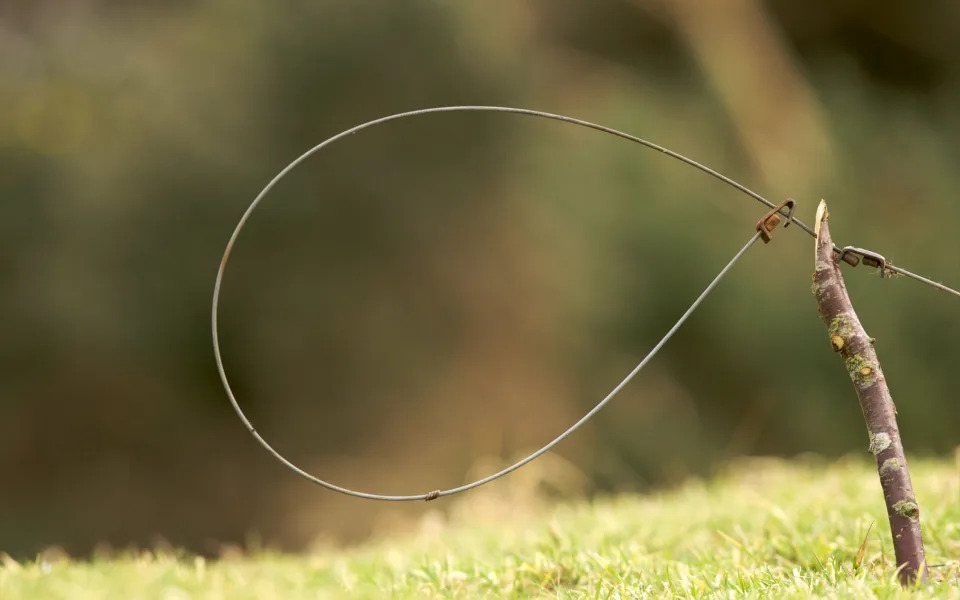VESTIGIAL RELIC
SNP snare ban will deliver ‘crippling blow’ to Scottish sports estatesSimon Johnson
Tue, 22 August 2023

The Scottish Government has already tightened controls on pest control - John MacTavish / Alamy Stock Photo
SNP ministers have been accused of delivering a “crippling blow” to Scotland’s sporting estates and farms after unveiling plans to ban them from using snares to control predators such as foxes.
Land managers warned the ban would damage livestock and be “devastating” for their efforts to conserve vulnerable species such as black grouse, capercaillie, curlews, golden plovers, grey partridges, lapwings and oystercatchers.
Scottish Land & Estates (SLE) said it would be “impossible” to prevent further “biodiversity loss” following “widespread declines” in their populations since the 1960s.
This is especially after a recent SNP crackdown on hunting with dogs in Scotland made it more difficult to flush foxes from cover to waiting guns.
Chris Packham, the TV presenter, lauded the plan as “excellent news”, saying: “These torture devices ought to have been banned a long time ago and I’m glad that the Scottish Government has finally recognised snares for the unacceptably cruel traps that they are.”
He urged the UK Government to follow suit in England after Wales became the first home nation in June to vote through a snare ban.
But SLE and Scotland’s gamekeepers pleaded with SNP ministers to allow an exemption so they could use “new humane holding devices” that they said allowed “non-targets” such as deer and badgers to free themselves.
They also expressed concern about plans to hand sweeping new investigatory powers to the Scottish Society for Prevention of Cruelty to Animals (SSPCA).
Authority to enter farms
This included giving SSPCA inspectors more authority to enter any farm or estate to search for evidence of alleged wildlife crimes, such as the killing of birds of prey.
SNP ministers unveiled the plans despite Police Scotland having previously opposed the move, warning that giving an animal welfare charity such powers could compromise an investigation’s impartiality.
A snare is a wire noose, usually attached to a stake or tree acting as an anchor, that is usually set to catch predators such as foxes or rabbits.
Although SNP ministers have previously tightened the rules around their use, they have previously recognised that setting them was a “legitimate activity” to control pests.
A Scottish Government consultation proposing the ban admitted that “control of predators is sometimes necessary” but said there was “sufficient evidence to show that use of snares can lead to unacceptable levels of suffering for wild animals”.
Arguing that snares were “indiscriminate”, it warned “they pose an unacceptable risk to non-target species including other wildlife and domestic species such as cats”.
The consultation will run six weeks until Oct 3, after which a snare ban is expected to be added as an amendment to the Wildlife Management and Muirburn (Scotland) Bill.
Gillian Martin, the SNP’s environment minister, said: “Snare traps lead to unnecessary suffering for animals and these proposals are part of our ongoing efforts to ensure that wildlife management is both sustainable and humane.
“Currently, only a small number of farmers and land managers use snare traps. More effective and humane forms of managing wildlife are available and we will continue to support the industry to make use of these methods.”
But Jake Swindells, director of the Scottish Countryside Alliance, said it was “alarming how dangerously inaccurate” her comments were and argued they showed a “complete misunderstanding” of how snaring works.
‘Already legislated’
He said: “Given the Scottish Government has already legislated against other practical and effective alternative forms of pest control, this proposal leaves risking those working in the countryside even more unequipped.
“The consequences of which could be devastating for some of our rarest species, including curlew and capercaillie. Well-designed snares, used properly, are a humane and effective form of fox control.”
It emerged last month that numbers of critically-endangered capercaillie have increased for the first time in eight years, but there remains only 542 left.
Ross Ewing, SLE’s director of moorland, said: “It is deeply regrettable that, at a critical moment in efforts to sustain biodiversity in rural Scotland, the Scottish Government is moving towards a ban on the use of snares, thereby removing another tool to manage predation pressure on vulnerable species.”
He urged SNP ministers to allow an exemption for humane cable restraints, which differ from conventional snares by including a breakaway function, warning it would be an “abdication of responsibility” for these to be included in the ban.
This was echoed by the Scottish Gamekeepers Association, which supported a ban on traditional snares but said the new devices were a “step-change for welfare”.
No comments:
Post a Comment